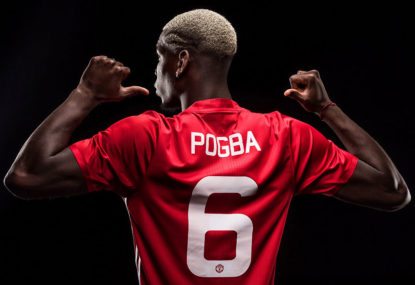'Don't understand the point': Newcastle forward tees off at VAR after controversial non-penalty
The challenge in the box left Anthony Gordon with a ripped sock and a sore ankle, but VAR deemed it not worthy of a…

Paul Pogba completed his move from Juventus to Manchester United for a reported world record fee of £89 million. While most United fans are on cloud nine at the news that the dabbing superstar is on his way to Old Trafford, some pundits have labelled the world record fee as ‘outrageous and extravagant’.
Excuse the French, but that is complete BS.
The demand for football globally and the different channels that make the game truly international have pumped the top European teams with wealth.
Mega deals, like the £5.1 billion for the right to broadcast the Premier League, means clubs are wealthier than ever. Consequently, funds to spend in the transfer market have multiplied drastically.
Clubs have more money to spend and therefore selling clubs require a higher price. This is before there is even competition between clubs for one player, which is where prices can really get out of control.
Effectively, this process is mass demand pull hyperinflation, caused by an extremely large injection of income. The more money that is available, the more players are going to cost.
So are pundits like Graeme Souness right to judge the club and the player? Absolutely not.
The value of the move is less to do with the qualities of the player, and more to do with prevailing economic factors. I mean, John Stones just left to Manchester City for a meagre £50 million for crying out loud.
Take the British transfer records over time. In 1893, Willie Groves moved from West Brom to Aston Villa for a staggering £100. In 1986, Mark Hughes left for Barcelona for a record fee of £2.3 million. In 2001 Juan Sebastian Veron joined the Red Devils for £28 million.
There is a naturally upward-sloping linear pattern mapping transfer records over time. While this slope is significantly steeper than that of headline inflation in any of the European countries, it doesn’t look out of line when compared with the growth of money in football.
The recent injection of funds into leagues such as the Premier League have only accelerated inflationary transfer prices. If there was an index for real transfer prices (prices without inflation), there would be startling similarities between transfers over history.
The obvious exception to this is Cristiano Ronaldo, who cost £50 million more than Robinho only one year after the Brazilian moved to City. The price Real Madrid forked out for arguably the best player in the world was because of the qualities he possessed.
That is why Souness argument is so damn basic. Sure, you have to identify which players have the qualities to fit your team’s demands, but the price you end up paying is less to do with those qualities and more to do with the economics of football.